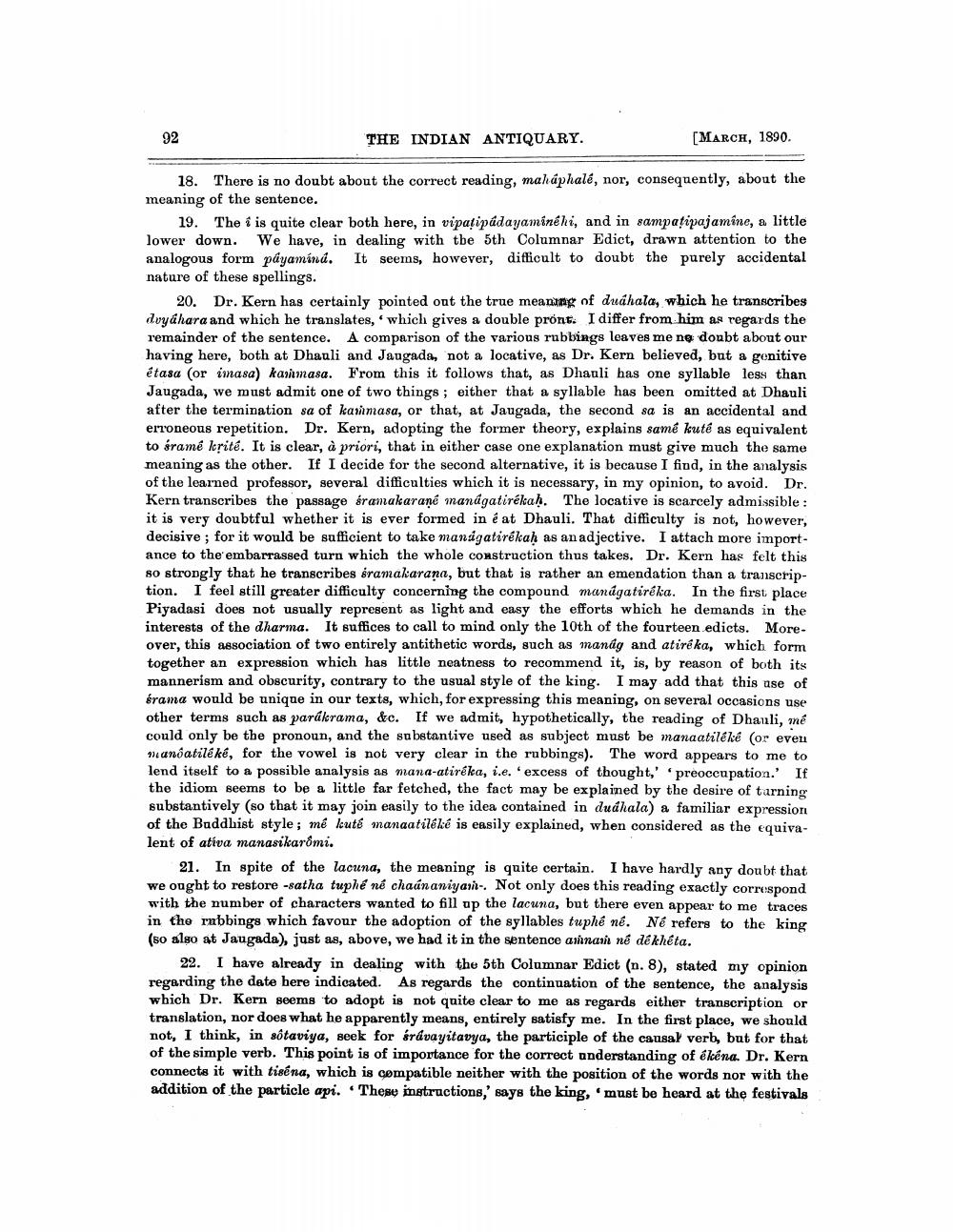________________
92
THE INDIAN ANTIQUARY.
[MARCH, 1890.
18. There is no doubt about the correct reading, maháphalé, nor, consequently, about the meaning of the sentence.
19. The i is quite clear both here, in vipatipádayaminéhi, and in sampatipajamine, a little lower down. We have, in dealing with tbe 5th Columnar Edict, drawn attention to the analogous form payamind. It seems, however, difficult to doubt the purely accidental nature of these spellings.
20. Dr. Kern has certainly pointed out the true meaning of duáhala, which he transcribes dvyáhara and which he translates, which gives a double pront. I differ from him as regards the remainder of the sentence. A comparison of the various rubbings leaves me no doubt about our having here, both at Dhauli and Jaugada, not a locative, as Dr. Kern believed, but a genitive étasa (or imasa) karmasa. From this it follows that, as Dhauli has one syllable less than Jaugada, we must admit one of two things; either that a syllable has been omitted at Dhauli after the termination sa of karimasa, or that, at Jaugada, the second sa is an accidental and erroneous repetition. Dr. Kern, adopting the former theory, explains samê kuté as equivalent to sramé lcrité. It is clear, à priori, that in either case one explanation must give much the same meaning as the other. If I decide for the second alternative, it is because I find, in the analysis of the learned professor, several difficulties which it is necessary, in my opinion, to avoid. Dr. Kern transcribes the passage éramakarané nanágatirékah. The locative is scarcely admissible: it is very doubtful whether it is ever formed in é at Dhauli. That difficulty is not, however, decisive ; for it would be sufficient to take managatirékah as an adjective. I attach more importance to the embarrassed turn which the whole construction thus takes. Dr. Kern has felt this so strongly that he transcribes sramakarana, but that is rather an emendation than a transcription. I feel still greater difficulty concerning the compound manugatiréka. In the first place Piyadasi does not usually represent as light and easy the efforts which he demands in the interests of the dharma. It suffices to call to mind only the 10th of the fourteen edicts. More. over, this association of two entirely antithetic words, such as manag and atirêka, which form together an expression which has little neatness to recommend it, is, by reason of both its mannerism and obscurity, contrary to the usual style of the king. I may add that this ase of śrama would be unique in our texts, which, for expressing this meaning, on several occasions use other terms such as parákrama, &c. If we admit, hypothetically, the reading of Dhauli, me could only be the pronoun, and the substantive used as subject must be manaatiléke (or even mandatilé ké, for the vowel is not very clear in the rubbings). The word appears to me to lend itself to a possible analysis as mana-atiréka, i.e. excess of thought,' preoccupation. If the idiom seems to be a little far fetched, the fact may be explained by the desire of tarning substantively (so that it may join easily to the idea contained in dudhala) a familiar expression of the Buddhist style; mê leute manaatiléké is easily explained, when considered as the equivalent of ativa manasikaromi.
21. In spite of the lacuna, the meaning is quite certain. I have hardly any doubt that we ought to restore -satha tuphé né chaánaniyan-. Not only does this reading exactly correspond with the number of characters wanted to fill up the lacuna, but there even appear to me traces in the rabbings which favour the adoption of the syllables tuphê nê. Né refers to the king (so also at Jaugada), just as, above, we had it in the sentence annari né dekhéta.
22. I have already in dealing with the 5th Columnar Edict (n. 8), stated my opinion regarding the date here indicated. As regards the continuation of the sentence, the analysis which Dr. Kern seems to adopt is not quite clear to me as regards either transcription or translation, nor does what he apparently means, entirely satisfy me. In the first place, we should not, I think, in sôtaviya, seek for órávayitavya, the participle of the causal verb, but for that of the simple verb. This point is of importance for the correct understanding of ékéna. Dr. Kern connects it with tisena, which is compatible neither with the position of the words nor with the addition of the particle api. These instructions,' says the king, must be heard at the festivals




